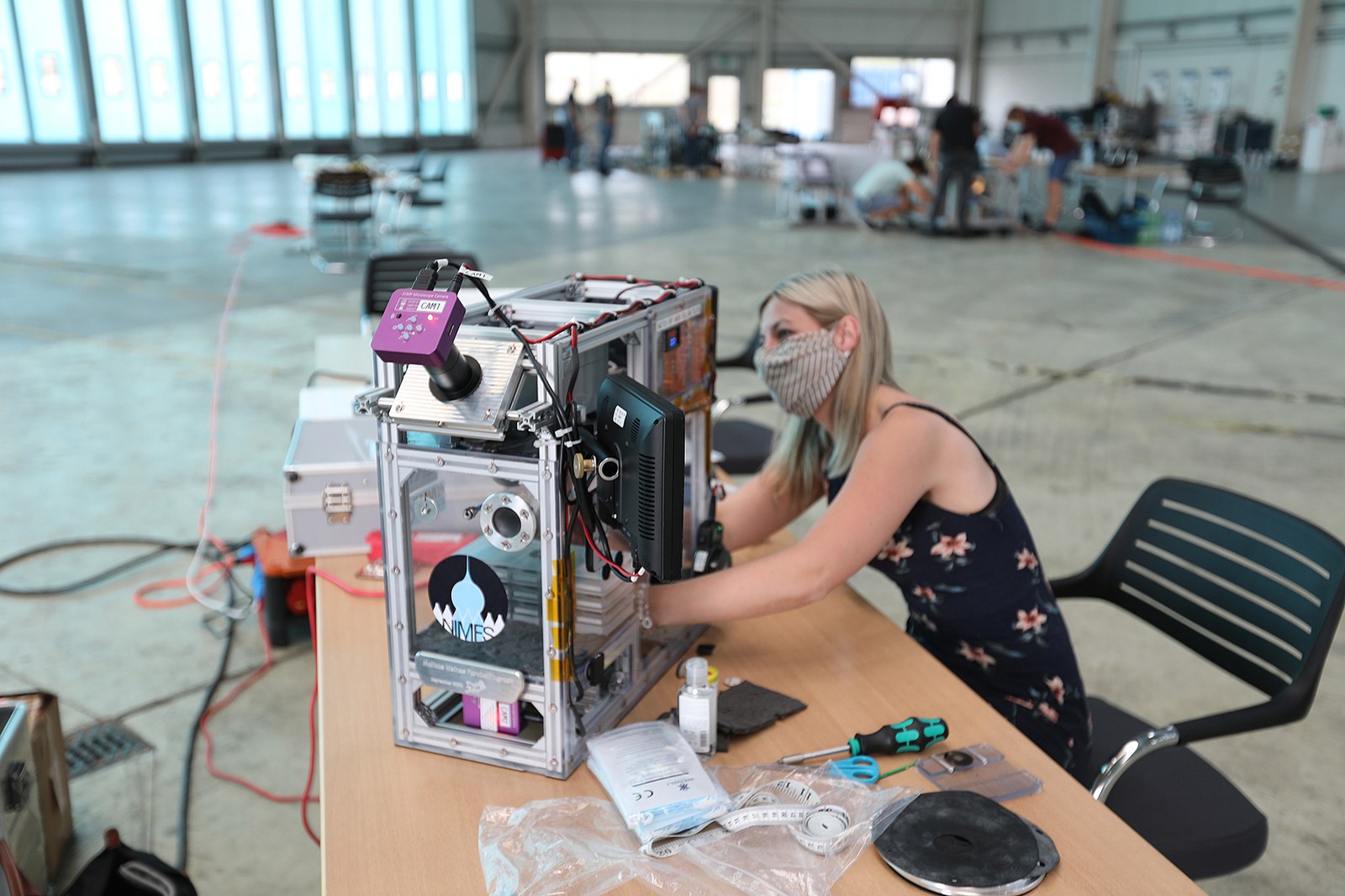Into microgravity with face masks


- The parabolic flight campaign planned for the beginning of September in Bordeaux is now taking place at Paderborn-Lippstadt Airport between 16 and 24 September 2020 due to the sharp increase in COVID-19 infections in France.
- On three planned flight days, eight technology, physics and materials science experiments will be carried out by teams from all across Germany.
- In addition to conducting the campaign in Germany, numerous health precautions on the parabolic flight will ensure the safety of the participants.
- Focus: Space
It is the 35th parabolic flight campaign of the German Aerospace Center (Deutsches Zentrum für Luft- und Raumfahrt; DLR), but nothing is routine on these flights under microgravity conditions. For the first time, scientists, engineers, and flight crew must master the challenges of their experimental research during the Coronavirus pandemic. At the very last moment, the flights had to be rescheduled. Due to a sharp increase in Coronavirus infections in France, the parabolic flights planned for the beginning of September in Bordeaux will now take off from Paderborn-Lippstadt Airport in North Rhine-Westphalia (NRW) from 21 to 24 September 2020. The Airbus A310 ZERO-G landed at the airport in East Westphalia during the afternoon of 16 September. By Sunday 20 September, the experiments of the participating scientific teams will be installed and prepared for the three days of flights under microgravity conditions.
"We are relieved that, despite the circumstances and the continuing dynamic development of the pandemic in Europe, we did not have to cancel the DLR parabolic flight campaign, but were able to transfer it to Germany at short notice," explains Thomas Jarzombek, a Member of the German Federal Parliament and Federal Government Coordinator of German Aerospace Policy. "As a resident of Düsseldorf and therefore a 'child of NRW', I am particularly pleased to show that research plays a prominent role in the state that is situated between the Rhine and Weser rivers."
On 31 August, two days before the planned launch date of the campaign, those responsible at the DLR Space Administration in Bonn felt compelled to cancel the flights in France due to safety concerns arising from the increase in local Coronavirus infections. "The mission then became to find a replacement airport with the necessary capacity and conditions for parabolic flights from 16 September within the short time available," says Walther Pelzer, a member of the DLR Executive Board and Head of the DLR Space Administration, explaining the extraordinary situation. "A further postponement of the campaign this year would not have been possible due to the limited availability of the A310 ZERO-G. Bringing the parabolic flight to Paderborn at such short notice was an enormous challenge, but all those involved – Novespace, Paderborn Airport, scientists from across Germany, and the DLR Space Administration – managed it together. This shows what can be achieved through cooperation even under the most difficult conditions."
During the three planned flight days – 21 to 23 September, with a backup day on 24 September – eight technology, physics and materials science experiments operated by science teams from all across Germany will be on board the A310 ZERO-G, which is operated by the French company Novespace.
With 'SESIMAG II', for example, a research team from the Technical University of Dresden wants to test a new method for processing rare-earth elements. Rare-earth elements occur naturally and are used in advanced technologies, such as the manufacturing of computer chips and solar panels. In conventional industrial processes, large quantities of solvents are used to process these materials. The scientists want to test a new method during parabolic flights, in which the use of solvents is replaced by a mechanical process referred to as magnetic separation. This could make the production of high-tech equipment significantly more environmentally friendly.
"As things stand today, we will leave for the French Atlantic coast at around 09:30 on all three planned flight days, weather permitting, to fly 31 parabolas over the open sea," says Katrin Stang, Parabolic Flight Programme Manager at the DLR Space Administration. “Due to the longer outward and return flight time, we will probably be in the air for four to five hours per day instead of the usual three to four."
AHA rules and temperature measurements are prerequisites for flight
In addition to conducting the campaign in Germany, numerous safety precautions ensure the safety of the participants during the parabolic flights. Those boarding the A310 ZERO-G must undergo even stricter controls than those returning to Germany from high-risk areas. Not only must the usual AHA (Atemschutz, Hygiene, Abstand; mouth and nose covering, hygiene, social distancing) rules be observed, but participants are also required to have their body temperature measured every day. The on-site science teams have been limited to the people absolutely necessary to carry out the experiments – approximately half the number of people that would be on site during a normal campaign. Wherever possible document exchange and communication between the participants is done electronically or by telephone. The safety briefing for all participants will also be carried out by video for the first time.
"For us scientists, the postponement of the parabolic flights by several weeks and the closure of the laboratories and facilities during the Coronavirus lockdown were the main obstacles to our experiment preparations," says Christina Knapek from the DLR Institute of Materials Physics in Space. "Experiment systems and samples must be prepared for their flight with absolute precision. However, this is not easy when the laboratories are closed."
The A310 ZERO-G will also be on display on Flightradar24 under the identifier F-WNOV from about 10:00 a.m. on flight days 21-23 September.
More images of the parabolic flight can be found in the DLR Flickr gallery.

